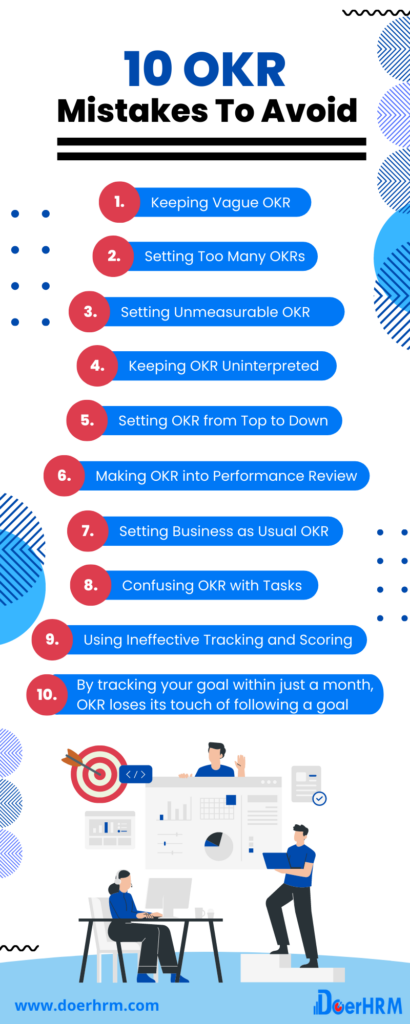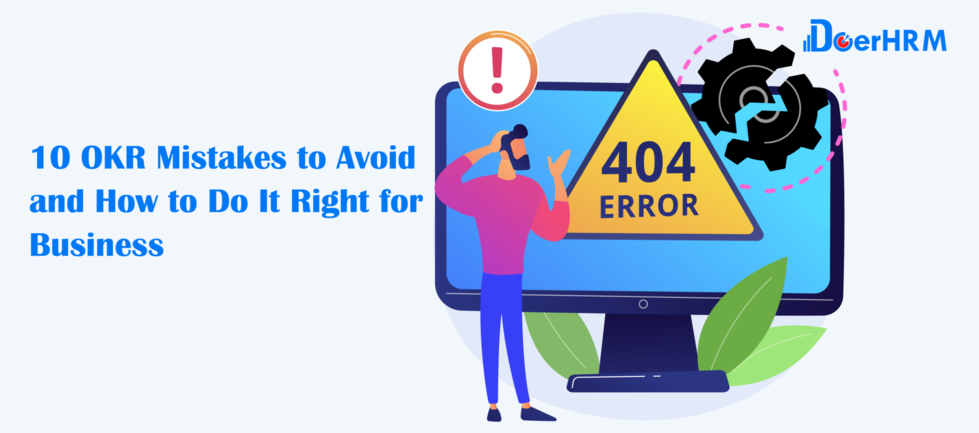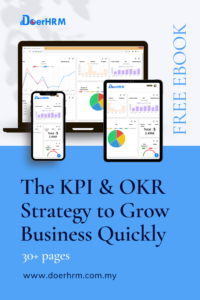Avoiding OKR Mistakes: Best Practices for Business
The Objectives and Key Results – OKR concept is a performance management technique, with a strategic, goal-setting framework for defining and tracking objectives and their outcomes. Andy Grove directed it in the 1970s at Intel, while John Doerr led it in 1999 at Google, where it became widely known.

The “how?” to using OKR is by following the SMART principle. To be SMART with your OKR means to set specific, measurable, ambitious, realistic, and timely objectives and key results.
The cost of a good OKR is knowing your way around steep edges of writing and implementing the concept and avoiding those edges in order not to fall over the cliff. Below are 10 of those mistakes to avoid in OKR and their right uses.
To learn how OKRs can help take your team to the next level, enroll in our OKR Mastery course and earn a 35% commission when you invite others to join this course!
1. Keeping Vague OKR:
Vague OKR lacks the cutting-edge specificity that good OKR demands. An example is setting a goal for December 23rd or setting a goal for the end of the year. December 23rd carries more specificity to it than the end of the year.
Solution: Be specific with OKR, use numbers, and a specific day of the month.
2. Setting Too Many OKRs:
Setting too many OKR tasks makes the concept an overwhelming one to achieve. Such a vast list can be distracting, which may undermine the whole idea of OKR due to ambiguity.
Solution: When you set objectives, have 3-4 key results. Also, pick 2-3 of the essential results to prioritize and stick to them. Unachieved objectives but yet important, can be carried on to the next quarter.
3. Setting Unmeasurable OKR:
Without being able to break down your objectives and key results, you cant work towards it. This implies that if you cannot measure it, you cannot manage it.
Solution: Break down your key results with measurable units. Or employees should discuss with their employers each others’ roles in achieving the set objective.
4. Keeping OKR Uninterpreted:
Keeping OKR uninterpreted to the employees is as good as not having OKR in place. It can also mean keeping it private.
Solution: The employer must carry his team along in other to avoid redundancy of employees by sharing with them the specificity of their objectives.
5. Setting OKR from Top to Down:
Setting OKR from top to bottom/down is often the traditional way of setting OKR. However, this method is ineffective, because, usually, wrong goals are set.
Solution: To avoid setting the wrong goals, it is better to have the people doing the work, also setting the goals.
6. Making OKR into Performance Review:
The purpose of OKR is not to evaluate the performance of employees, nor is it a tool to be used by the HR to compensate employees.
Solution: Avoid using OKR for performance review. If you do not, employees will set achievable personal goals to see that compensation keeps increasing. In the long run, OKR will be neglected.

7. Setting Business as Usual OKR:
Performance management is supposed to be the forward-looking process used to set goals and regularly check progress toward achieving those goals. This implies that doing the same thing you have been doing is not an effective use of performance management.
Solution: OKR must be written in such a way that it highlights what the team believes it can achieve by improving what is already being done.
8. Confusing OKR with Tasks:
OKR is not a to-do list. OKR is also not a note made to check your daily routines.
Solution: Make a result-oriented list. OKRs are designed to convey goals, what you are trying to achieve. Therefore, avoid using OKR to do things but instead to achieve the long term goals.
9. Using Ineffective Tracking and Scoring:
Employers can’t just enforce rules or new goals down on the subordinates and expect them to follow the plans to detail.
Solution: The employer must check-in weekly depending on their team’s need to check the progress and effectiveness of the performance management in play. The acute scoring system should also be in place.
10. By tracking your goal within just a month, OKR loses its touch of following a goal.
Instead, it is limited to tracking the task in that specific month. It is also possible that the result will come after a month. For obvious reasons, if key results ought to be carried out the next month, the opportunity to do so is no more there.
Solution: Having a quarterly or annual management approach gives place to the timely accomplishment of OKR.
If you have encountered any of these mistakes while using OKR, and it has caused damage, it is not out of the question to tank the concept mid-cycle. However, instead of just doing away with it, you can correct the mistakes. When you do not want to make the correction yourself, you can get an OKR coach to train you in using the most popular performance management techniques.







